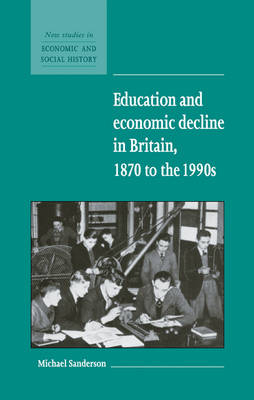
Education and Economic Decline in Britain, 1870 to the 1990s
Seiten
1999
Cambridge University Press (Verlag)
978-0-521-58170-7 (ISBN)
Cambridge University Press (Verlag)
978-0-521-58170-7 (ISBN)
Since the 1870s the British economy has steadily declined from its position as the 'workshop of the world' to that of a low-ranking European power. Michael Sanderson offers a concise and accessible analysis of the question of how far defects in education and training have contributed to this economic decline.
Since the 1870s the British economy has steadily declined from its position as the 'workshop of the world' to that of a low-ranking European power. Michael Sanderson examines the question of how far defects in education and training have contributed to this economic decline. By looking at issues such as literacy, the quality of scientific and technical training, the supposed anti-industrial bias of public schools and the older universities, the neglect of vocational and technical training and the neglect of the non-academic teenager, Michael Sanderson demonstrates that education was far from the sole cause of economic decline, but that its deficiencies have certainly played a part. This book offers an accessible and concise analysis of a topic of current importance, interest and debate and will be of interest to students and teachers of the history of education and its impact on British economic development in the twentieth century.
Since the 1870s the British economy has steadily declined from its position as the 'workshop of the world' to that of a low-ranking European power. Michael Sanderson examines the question of how far defects in education and training have contributed to this economic decline. By looking at issues such as literacy, the quality of scientific and technical training, the supposed anti-industrial bias of public schools and the older universities, the neglect of vocational and technical training and the neglect of the non-academic teenager, Michael Sanderson demonstrates that education was far from the sole cause of economic decline, but that its deficiencies have certainly played a part. This book offers an accessible and concise analysis of a topic of current importance, interest and debate and will be of interest to students and teachers of the history of education and its impact on British economic development in the twentieth century.
Introduction; 1. Literacy and schooling; 2. Was technical education to blame?; 3. The counterarguments; 4. The education of the elite, 1870–1914; 5. 1914–44: missed opportunities; 6. Postwar decline: the betrayed teenager?; 7. Higher education and the public schools: privilege and relevance?; Conclusion.
| Erscheint lt. Verlag | 22.4.1999 |
|---|---|
| Reihe/Serie | New Studies in Economic and Social History |
| Zusatzinfo | 15 Tables, unspecified |
| Verlagsort | Cambridge |
| Sprache | englisch |
| Maße | 143 x 224 mm |
| Gewicht | 300 g |
| Themenwelt | Geisteswissenschaften ► Geschichte ► Regional- / Ländergeschichte |
| Geschichte ► Teilgebiete der Geschichte ► Kulturgeschichte | |
| Geschichte ► Teilgebiete der Geschichte ► Sozialgeschichte | |
| ISBN-10 | 0-521-58170-2 / 0521581702 |
| ISBN-13 | 978-0-521-58170-7 / 9780521581707 |
| Zustand | Neuware |
| Haben Sie eine Frage zum Produkt? |
Mehr entdecken
aus dem Bereich
aus dem Bereich
der stille Abschied vom bäuerlichen Leben in Deutschland
Buch | Hardcover (2023)
C.H.Beck (Verlag)
CHF 32,15
vom Mittelalter bis zur Gegenwart
Buch | Softcover (2024)
C.H.Beck (Verlag)
CHF 16,80
Die Revolution des Gemeinen Mannes
Buch | Softcover (2024)
C.H.Beck (Verlag)
CHF 16,80


